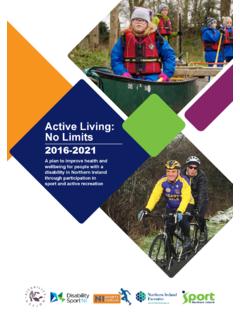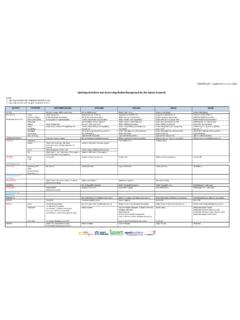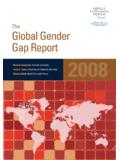Transcription of Mental Health and Wellbeing Interventions in Sport: A ...
1 Mental Health and WellbeingInterventions in Sport: A Review and Recommendations MENTALHEALTHMENTALHEALTHR esearch TeamDr Gavin Breslin, Stephen Shannon, Tandy Haughey, Dr Paul Donnelly and Professor Gerry Leavey - Sport and Exercise Sciences Research Institute, Sport Northern Ireland and the Bamford Centre for Mental Health and of the Strategy Steering Group for Mental Health and Wellbeing In and Through SportDr John Kremer - Independent ChairDr Paul Donnelly - Sport Northern IrelandDr Gavin Breslin - Ulster UniversityRobert Heyburn - Department for CommunitiesFiona Teague - Public Health AgencyTom McEneaney - AwareBeth Gibb - Action on Mental HealthEdward Gorringe - MindwiseCiaran Kearney - Northern Ireland Sport ForumMaura McMenamin - Ulster Council Gaelic Athletic AssociationKeith Gibson - Irish Football AssociationChris Shields - Ulster RugbyKate Hills - Swim IrelandJoseph Donnelly - TAMHIPaul Stephenson - NSPCC Child Protection in Sport Unit Northern IrelandCiar n Kearney - Ulster UniversityGary Woods - PsychiatristAlan Curran - Sport Northern IrelandJohn News - Sport Northern IrelandColm Jennings.
2 Sport Northern IrelandMENTALHEALTHMENTALHEALTHE xecutive Summary 01 Aims 01 Findings 01 Introduction 02 Research Review Aims and Objectives 03 Method 04 Results 07 Recommendations 12 Appendix 14 Table 1 14 Table 2 15 Table 3 17 References 18 Contents01 MENTALHEALTHW hile participation in sport can have positive physical and Mental Health benefits, evidence suggests that, particular aspects of competitive sport may also, paradoxically, contribute to deterioration in Mental Health .
3 The sport setting lends itself to the communication of positive Mental Health and Wellbeing messages, yet the best way of achieving the delivery of these messages remains uncertain. In response to this uncertainty, a review of Mental Health and Wellbeing awareness programmes in sport was undertaken in order to provide direction to the Strategy Steering Group for Mental Health and Wellbeing In and Through Sport on how best to engage the sporting community. Aims To identify and examine the effectiveness of international peer reviewed programmes that promote Mental Health and Wellbeing awareness in sport; and To review regional Mental Health and Wellbeing policies, strategies and Interventions . To do so, two key phases of the research were completed by the Research Team: 1. A desk-based review using Preferred Reporting Items for Systematic Reviews and Meta-Analyses (PRISMA) guidelines; and 2.
4 Focus group discussions and face-to-face interviews with key stakeholders in Mental Health and Wellbeing in Northern Ireland. Findings The findings from the current review suggest that while knowledge-based Mental Health programmes in sport settings may improve Mental Health literacy and reduce stigma, the evidence base is interviews and focus group discussions indicated the existence of at least 16 sport- based programmes in Northern Ireland. To our knowledge, these programmes have not been evaluated. Participants also had concerns related to: Who should deliver training in clubs? The resources available? Who should attend training? Questions were also raised with reference to what would be the specific role of a Club Wellbeing Officer, if established, and whether this was to sign post to already existing services or provide support.
5 Recommendations include: The need to develop a Mental Health and Wellbeing In and Through Sport Strategy / Action Plan and secure resourcing; Determining which programmes for Mental Health and Wellbeing awareness are effective and should be introduced in sport settings for coaches, athletes and club members; The introduction of a Mental Health and Wellbeing Officer to sport clubs; and Integrating Mental Health and Wellbeing within already established networks across sport in Northern Summary02 MENTALHEALTHI ntroductionSport and Health benefitsSport can have positive psychosocial benefits, and moderate-to-vigorous intensity physical activity can improve physical and Mental Health (Biddle, Mutrie & Gorely, 2015). However, evidence suggests that competitive sport may contribute to poor Mental Health (Bauman, 2016) and may lead to specific stressors that hinder an athletes Mental Health optimisation (Donohue et al.)
6 , 2007). These stressors are: Pressure to achieve success (Evans, Weinberg, & Jackson, 1992); Extended times being separated from family (Masland, 1983); Negative emotional consequences of injury (Wiese-Bjornstal, 2010); Substance and alcohol abuse (King, Dowdall, & Wagner, 2010); and Relationship problems (Donohue et al, 2007). The likely times of higher stress or risk of Mental Health problems for athletes are during times of career transition ( retirement), non-selection or whilst being within sport are just starting to address the management of Mental Health (Bauman, 2016). However, athletes are poorly supported to manage their Mental Health ; instead, sporting culture celebrates Mental toughness and is disapproving of any weakness disclosure. This situation has not been helped when an athlete s Mental Health is discussed using language related to Mental illness (Hughes and Leavey, 2012).
7 Consequently, emotional and psychiatric problems for many athletes remain hidden (Bauman, 2016). It is through the delivery of Mental Health training to coaches and players, within their own sport settings, that awareness to managing Mental Health concerns can increase (Breslin et al, 2017). Linking sport and Wellbeing together in Northern IrelandFollowing a roundtable discussion 12 October, 2012 on Mental Health and Wellbeing , chaired by Car l N Chuil n, the then Minister Department of Culture Arts and Leisure (DCAL) , DCAL and Sport Northern Ireland drafted a pilot programme in support of the Public Health Agency s (PHA) campaign to raise awareness of Mental Health issues for sports clubs. The Mood Matters in Sport report (Breslin, et al. 2015; 2017), an evaluation of a pilot psycho- educational programme to enhance knowledge and help-seeking of coaches in sport, indicated that sports clubs provide an effective and accessible environment for tackling Mental Health issues.
8 Engagement in awareness raising and training opportunities enables sports clubs to enhance people s knowledge and confidence in supporting others, and also promote Mental Health at club level. Despite the positive outcomes reported from the Mood Matters in Sport report, several questions remained: (a) what other Interventions are effective?; (b) what has been evaluated?; (c) who have been delivering programmes to, (i) athletes, (ii) coaches and (iii) club members?; and finally what was the content and duration of programmes being delivered across Northern Ireland. By 03 addressing these questions, the development, implementation and dissemination of subsequent programmes can be determined. Round table discussion on Mental Health in and through sport On 26 January, 2016, Sport Northern Ireland hosted the first stakeholder workshop Mental Health and Wellbeing In and Through Sport which was attended by: Department for Communities (DfC) representatives; national governing bodies of sport; Health professionals; university academics; community groups; and representatives from psychology, psychiatry, sports clubs, and Mental Health charitable organisations.
9 The aim of the workshop was to begin discussions on the need for a strategy / action plan for Mental Health and Wellbeing in and through sport. At the workshop a report, considered and approved by the Board of Sport Northern Ireland, was tabled for discussion. Several actions from the meeting were:1. Appoint a lead officer within Sport Northern Ireland for Mental Health and Wellbeing In and Through Sport who would be responsible for both the strategic direction and operational aspects to drive this initiative forward;2. Sport Northern Ireland to sign up to the Mental Health Charter for Sport created and launched by Sport and Recreation Alliance in 2015;3. Establish a Mental Health and Wellbeing In and Through Sport Strategy Steering Group from all relevant statutory and voluntary partner organisations;4. Complete a desk-based review of relevant policies, strategies and Interventions that have used sport as a tool for promoting Mental Health and Wellbeing ; and finally,5.
10 Develop a Mental Health and Wellbeing In and Through Sport Strategy / Action Plan with an associated research monitoring and evaluation Review Aims and ObjectivesThe aim of the current report is to review Interventions that have used sport as a tool for promoting Mental Health and Wellbeing to provide guidance to the Strategy Steering Group. To achieve this aim, the research findings presented in this summary report had two main objectives:1. Conduct a systematic review of peer reviewed Interventions available across the world which promotes positive Mental Health and Wellbeing in sport; and2. Conduct a regional review of Mental Health and Wellbeing policies, strategies and Interventions . 1 To date, progress has been made by Sport Northern Ireland with Ulster University (Breslin et al.) in relation to points 1 and 3. Progress is being made with point 2; the current report addresses point 4, with the findings from the research contributing to point MethodTwo phases of research were conducted: Phase 1: a systematic review of six electronic databases; and Phase 2: qualitative interviews and focus groups with key stakeholders in the development, implementation or delivery of Mental Health and Wellbeing programmes through sport in Northern 1: Systematic review of peer reviewed Interventions in sport that have promoted positive Mental Health and Wellbeing Protocol All methods of data analysis and reporting followed the Preferred Reporting Items for Systematic Reviews and Meta-Analyses (PRISMA) guidelines (Moher et al.)










